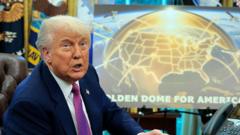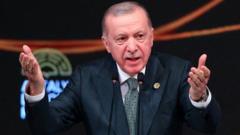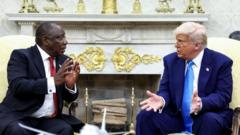The encounter between South Africa's President Cyril Ramaphosa and former US President Donald Trump brought unexpected ramifications for both leaders as Ramaphosa returns to domestic challenges amid international scrutiny.
Repercussions of Trump-Ramaphosa Encounter: A New Political Landscape in South Africa

Repercussions of Trump-Ramaphosa Encounter: A New Political Landscape in South Africa
Cyril Ramaphosa faces dual pressures domestically and internationally after tense talks with Donald Trump.
Following a high-profile meeting in Washington that was televised globally, President Cyril Ramaphosa's diplomatic skills were put to the test as he navigated intense questioning and accusations from Donald Trump regarding claims of "white genocide" in South Africa. The visit aimed to secure trade agreements, providing critical economic support, but instead devolved into a dramatic confrontation that has polarized opinions back home.
Many South Africans viewed Ramaphosa's composed demeanor as a testament to his leadership during a challenging time, but critics back home are questioning his effectiveness. The backdrop of escalating crime rates, deepening corruption, and a stagnant economy only compounds pressure on the ruling African National Congress (ANC), which is struggling to maintain stability within its governing coalition.
Ramaphosa's historical significance as a negotiator during the end of apartheid and a facilitator in moments of national crisis is central to his reputation, but competing factions within the ANC and external criticism from leaders like Julius Malema challenge his position. The fallout from the Washington meeting could serve to reinforce his standing among certain voters who desire steady leadership amid chaos, even while facing dissent from radical factions.
Political analysts suggest that while Ramaphosa may return from Washington facing a daunting political landscape, the optics of unity presented during the meeting could furnish a renewed sense of purpose for both his administration and coalition partners. However, the pressures of re-stabilizing the ANC and addressing South Africa’s pressing socio-economic issues remain his paramount challenge.
As Ramaphosa re-enters the political fray, observers are left to ponder the long-term implications of his encounter with Trump; a moment that might reset his narrative among the electorate and reshape the dynamics of governance in South Africa.
Many South Africans viewed Ramaphosa's composed demeanor as a testament to his leadership during a challenging time, but critics back home are questioning his effectiveness. The backdrop of escalating crime rates, deepening corruption, and a stagnant economy only compounds pressure on the ruling African National Congress (ANC), which is struggling to maintain stability within its governing coalition.
Ramaphosa's historical significance as a negotiator during the end of apartheid and a facilitator in moments of national crisis is central to his reputation, but competing factions within the ANC and external criticism from leaders like Julius Malema challenge his position. The fallout from the Washington meeting could serve to reinforce his standing among certain voters who desire steady leadership amid chaos, even while facing dissent from radical factions.
Political analysts suggest that while Ramaphosa may return from Washington facing a daunting political landscape, the optics of unity presented during the meeting could furnish a renewed sense of purpose for both his administration and coalition partners. However, the pressures of re-stabilizing the ANC and addressing South Africa’s pressing socio-economic issues remain his paramount challenge.
As Ramaphosa re-enters the political fray, observers are left to ponder the long-term implications of his encounter with Trump; a moment that might reset his narrative among the electorate and reshape the dynamics of governance in South Africa.


















